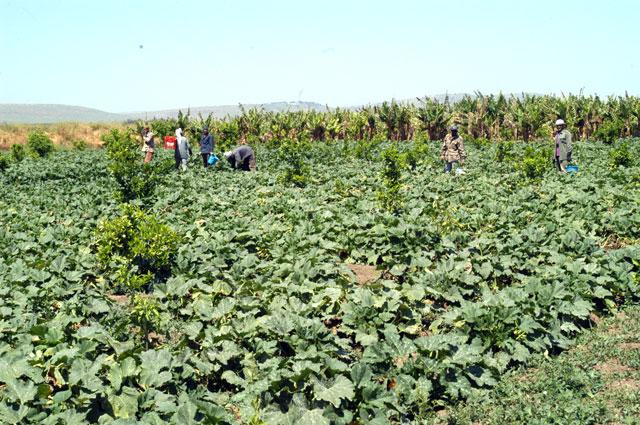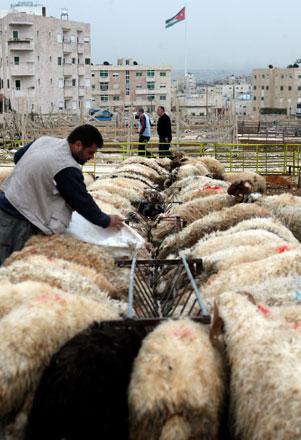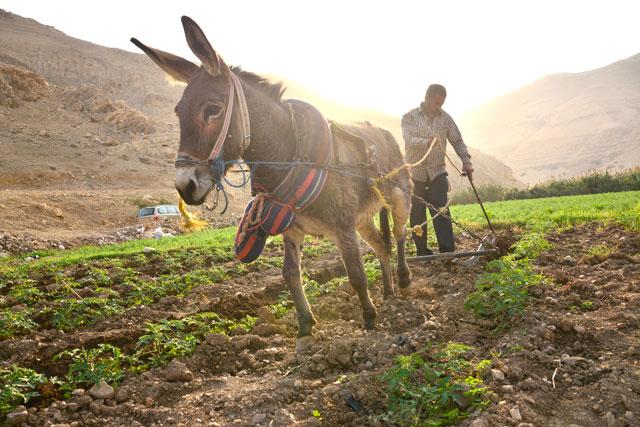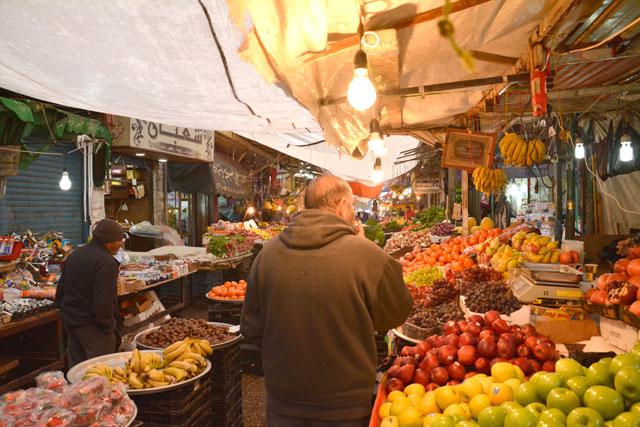You are here
JD14m project to begin in March to enhance agricultural productivity, food security
By Hana Namrouqa - Feb 04,2017 - Last updated at Feb 04,2017

The Agriculture Ministry says it has secured JD650,000 for the two-month training courses it plans to offer under a mega-project to rejuvenate the sector (JT file photo)
AMMAN — Implementation of a multimillion-dollar project to enhance food security and agricultural productivity across the Kingdom will commence in March, according to a senior government official.
The mega-project will train people from all governorates on vocational agricultural skills and “agribusiness management”, and then secure them with funds to start their own food and animal production projects, Minister of Agriculture Khaled Hneifat said on Thursday.
“The national project seeks to improve food security and self-sufficiency in livestock and agricultural products, while securing people with a sustainable source of living,” Hneifat noted at a meeting with the press.
The project is worth JD14 million, he said, highlighting that it is scheduled to be completed by the end of this year.
Under the scheme, the Agriculture Ministry plans to train people across the Kingdom on vocational agricultural and agribusiness skills for two months before identifying in which agricultural or vocational field they seek to start their own businesses.
The project also entails providing funding for proposed business ideas, Hneifat said, noting that permanent markets will be established in each governorate to display the products of the small businesses which will be established under the mega scheme.
A private firm will be responsible for collecting, marketing and selling the products at the permanent markets, according to the minister, who added that it will receive a percentage of the sales.
“The markets will be built before the end of this year,” Hneifat said.
The ministry has already secured JD650,000 for the two-month training, he noted, adding that it is in the process of securing the funding of the project from the World Food Programme.
“Our goal is to strengthen the country’s self-sufficiency to reduce its reliance on imports,” the minister stressed.
Opening new markets and also retrieving lost ones for the country’s exports of fruits, vegetables and live sheep are also among the ministry’s top challenges.
The Kingdom’s agricultural sector is suffering due to regional conflicts and instability. Jordan has lost the Syrian and Iraqi markets, whether as major exporting destinations for animal and food products or as transit points for exports to Europe and the Gulf, Hneifat said.
The Karameh-Tureibil crossing on the border between Jordan and Iraq, the gateway for Jordanian produce to reach Iraqi and European markets, was closed in the summer of 2015.
Also in 2015, Jordan closed the Jaber border crossing with Syria for security reasons, while Ramtha, the other border crossing with the war-torn country, has been closed for nearly five years.
“The country used to export 700,000 tonnes of fruits and vegetables to Iraq and Syria per year, but now we are only exporting 90,000 tonnes annually to Iraq and at much higher costs because exports reach the Iraqi market via Kuwait,” Hneifat said.
In addition to the drop in produce exports, Jordan also registered a drop in its exports of live sheep to the Gulf Arab market in 2016, according to the ministry, which indicated that exports of live sheep to the Gulf Arab market last year stood at 422,000 heads; a 26.4 per cent drop compared to 2015.
The ministry is working to find new marketing portals for local fruit and vegetables, the minister underscored, highlighting that he has already met with over 20 ambassadors to Jordan to facilitate exporting to their countries.
The ministry seeks to increase exports to Israel, the West Bank and the Gulf, Hneifat said, noting that 4,000 tonnes of produce were exported to Israel during the past month.
Hneifat stressed that the declining exports of live sheep caused prices to plummet locally, attributing the drop in exports to a lower demand from Saudi Arabia in particular.
But the ministry is targeting the Gulf market, mainly the United Arab Emirates, Kuwait and Qatar, to raise the Kingdom’s exports of live sheep, he said, highlighting that exports as a result have been showing signs of recovery so far this year.
“The Kingdom exported 24,500 heads of live sheep to the Gulf during January, which is a 35 per cent increase compared to the same period last year,” Hneifat told reporters.
Opening the markets of Israel and the West Bank to the country’s live sheep is also expected within a month, while a Saudi delegation is scheduled to visit the Kingdom to discuss increasing exports of local sheep to the Saudi market.
The minister underscored that supporting farmers and providing them with incentives is vital to revive the agricultural sector.
He announced that the ministry plans to compensate farmers who incurred losses in last November’s frost spell.
“For the first time since its establishment in 2009, the ministry will compensate farmers from the agricultural risk fund, which now has JD4.5 million,” Hneifat noted.
The five-day frost spell, during which temperatures dipped to -1ºC at the usually-warm Jordan Valley, vegetables such as zucchini, eggplant, bell pepper, beans and potato were hit by the freezing temperatures.
Hneifat said the ministry plans to establish an agricultural insurance company to compensate farmers who incur losses during snow, floods and heatwaves, noting that farmers wishing to benefit from the insurance company will be required to pay a percentage annually.
Related Articles
AMMAN — Sheep exports are expected to recover this year, an official said on Sunday, citing figures indicating a 35 per cent increase since
AMMAN — A set of measures will be implemented this year to address agricultural marketing bottleneck and strengthen the resilience of the ag
AMMAN — Exports of fruit and vegetables during January dropped by 35 per cent compared to the same period last year, a government official s


















